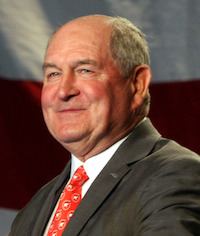
Last week we learned that former Georgia Governor Sonny Perdue is President Trump’s nominee for U.S. Secretary of Agriculture. Perdue, educated as a veterinarian and the son of a farmer, spent much of his career in business, including running a garden supplies company, shipping operation, and a fertilizer and grain company.
In announcing the nomination, Trump called Perdue a governor of a “big agriculture state.” But Georgia is not a top state for agricultural production. Based on USDA statistics, California and Iowa lead in that category – Georgia is not even listed in the top ten. “Alternative facts” aside, Sonny Perdue is just the latest Trump Cabinet nominee about whom we all should be concerned.
Can a Big Ag Cheerleader Speak Up for Small New England Farmers?
President Trump’s nominees for other Cabinet positions have been bankrolled by Big Gas and Big Oil, so why wouldn’t his pick to steward the nation’s farms be in thrall to Big Ag? But Perdue’s ties to Big Ag could interfere with his ability to be a voice for smaller, sustainable agriculture (the kind that characterizes many New England farms). Those ties could also interfere with his ability to advocate objectively on important issues such as water quality, sustainability, and food safety, among others.
Perdue’s experience with the fertilizer industry, in particular, raises concerns that he is unlikely to take a sustainable approach to regulating agribusiness, especially where those regulations impact our environment and health. For example, regulations around farm fertilizer runoff are important for keeping our rivers and lakes clean and our seafood industry viable (ever heard of a red tide?).
Granted, even under prior administrations, USDA farm programs have not been designed to serve the type of agriculture we have here in New England. However, we should ask whether Perdue’s USDA would move even further away from small, diversified farms, which are an integral component to a resilient food system and a strong regional food economy. For us here in New England, the choice of Perdue increases the urgency to create strong local and regional policies and programs to support the kinds of farms prevalent in our region, starting with the actions and recommendations identified in our report, New England Food Policy: Building a Sustainable Food System.
We Can’t Afford Another Anti-Science, Climate Change Skeptic in the Cabinet
Perdue’s stance on sustainable agriculture matters especially in light of the challenges that climate change poses for food producers across the nation, including New England. Perdue has a reputation as a climate change skeptic, having made his opinion clear in a 2014 op-ed about a different topic. While this may not be a surprise given Trump’s own stance on climate change, that doesn’t make it any less problematic given the key importance of the issue: industrial agriculture contributes to climate change, and climate change increasingly plays a role in damaging agriculture’s viability, economic and otherwise. With these short-term and long-term stakes at odds with each other, leaders of our nation’s agriculture sector must be able to appropriately balance these interests to support a resilient food supply.
Our Recommendations for the New Secretary of Agriculture
A strong nation and a healthy food system go hand in hand. Here are our three recommendations for Sonny Perdue as he prepares to oversee America’s farm economy:
- Don’t turn agriculture into easily toppled monopolies and monocultures, which are a threat to the viability of small farmers and a danger to our national food supply in the face of climate change.
- Do create more programs and incentives that support and strengthen small, diversified farm operations. We need more small farms to be able to thrive in our changing climate, not fewer.
- Do be a voice for all farmers, including those of all ages and backgrounds.
As technology advancements and climate impacts reshape our food production capabilities, our nation’s farmers will need to be flexible enough to pivot and support the future of food, even if that future looks more like New England than it does the farm belt. Our farmers (and those of us who depend on them) need a USDA – and a Secretary of Agriculture – who will innovate with them, not a Big Ag crony who will roll back regulations and ignore the biggest threats our farm economy has faced since the Dust Bowl.



